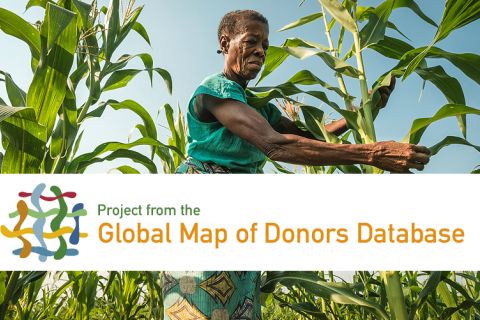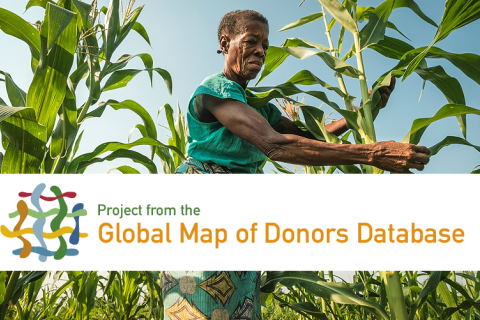The Global Donor Platform for Rural Development is a network of 38 bilateral and multilateral donors, international financing institutions, intergovernmental organisations and development agencies.
Members share a common vision that agriculture and rural development is central to poverty reduction, and a conviction that sustainable and efficient development requires a coordinated global approach.
Following years of relative decline in public investment in the sector, the Platform was created in 2003 to increase and improve the quality of development assistance in agriculture, rural development and food security.
// Agriculture is the key to poverty reduction
Agriculture, rural development, and food security provide the best opportunity for donors and partner country governments to leverage their efforts in the fight against poverty.
However, the potential of agriculture, rural development and food security to reduce poverty is poorly understood and underestimated.
Cutting-edge knowledge of these issues is often scattered among organisations, leading to competition, duplication of efforts, and delays in the uptake of best practices.
// Addressing aid effectiveness
Therefore the Platform promotes the principles of the Paris Declaration on Aid Effectiveness, the Accra Agenda for Action for sustainable outcomes on the ground, and the Busan Global Partnership for Effective Development Cooperation.
Increasing aid to agriculture and rural development is not enough. Donors must work together to maximise development impact.
// Adding value
The Platform adds value to its members’ efforts by facilitating the exchange of their development know-how, which consolidates into a robust knowledge base for joint advocacy work.
Working with the Platform, members are searching for new ways to improve the impact of aid in agriculture and rural development.
- An increased share of official development assistance going towards rural development
- Measurable progress in the implementation of aid effectiveness principles
- Greater use of programme-based and sector-wide approaches
- More sustainable support to ARD by member agencies
// Vision
The Platform endorses and works towards the common objectives of its member institutions to support the reduction of poverty in developing countries and enhance sustainable economic growth in rural areas.
Its vision is to be a collective, recognised and influential voice, adding value to and reinforcing the goals of aid effectiveness in the agricultural and rural development strategies and actions of member organisations in support of partner countries.
// Evaluation
Between August and October 2014, the Global Donor Platform for Rural Development underwent an Evaluation. The evaluators interviewed across board focal points (FPs) of member organisations, partner institutions, staff of the secretariat and key agricultural and rural development experts from different organisations involved in the Platform initiatives. KIT reviewed Platform documentation of the past 10 years, online resources and services to complete the assessment.
According to the report, the change in overall global development objectives of the Post-2015 agenda and its sustainable development goals (SDG) will only reiterate the relevance of the Platform’s work in coordinating donor activities. Agriculture and rural development are incorporated in many of the SDGs. The targeted development of appropriate policies and innovative strategies will depend on increased, cross-sectoral cooperation which the Platform stands for. The achievement of the Platform’s objectives of advocacy, knowledge sharing and network facilitation functions remains to be a crucial contribution to agriculture and rural development.
Members:
Resources
Displaying 16 - 20 of 808Support to the International Land Coalition Strategic Framework 2011-2015
General
Support to the Strategic Framework 2011-2015 of the International Land Coalition.
Transerve Technologies
General
While technology solutions can help drive efficiency, most urban local bodies find high quality solutions expensive. Transerve Technologies works with cities to provide affordable tech solutions to infrastructure management issues such as property tax collection. Transerve Technologies uses geospatial services such has unmanned aerial vehicles (UAVs) and satellite imaging to more efficiently serve its customers. In many Indian cities, Transerve provides more efficient ways for individuals to exercise their rights to property through itsSmartMu product, which is a GIS-based property tax management system.
Improving livelihoods for 6,000 marginalised women in DRC and supporting their access to land
General
This project will provide 6,000 socially-excluded women in South Kivu, DRC with a holistic training programme that will enable them to understand their rights; gain agricultural skills; access land and credit; and increase incomes. It will contribute to creating an enabling environment for women by training 1,500 male leaders on women’s rights and strategies to facilitate these rights; and by placing women’s right to access land on DRC’s development agenda via research and advocacy
Forest Land Use and Governance in Indonesia
General
The programme will address the challenges of deforestation and peat land degradation through investments to increase transparency and accountability, building capacity for spatial (land-use) planning, and engaging and mobilising the private sector in support of sustainable economic development. It does this by focusing on overcoming the critical governance failures for the sustainable management of forests and land-use
Agropastoral Value Chains Project in the Governorate of Médenine (PRODEFIL)
General
The project aims to improve the living conditions for 15,040 vulnerable rural households in the governorate of Medenine and to create new opportunities for employment by strengthening the resilience of agro-pastoral production systems. To that end, the project seeks to help public and private actors manage and develop local agro-pastoral value chains, including those for camelids and small ruminants. On land and natural resource governance, the project intends to strengthen rangeland management organizations, mostly through the capacity building of Agricultural Development Groups (GDAs). Furthermore it aims to improve natural ecosystems through the development of three participatory rangeland management plans. It also will undertake a study to create an inventory of water points.




